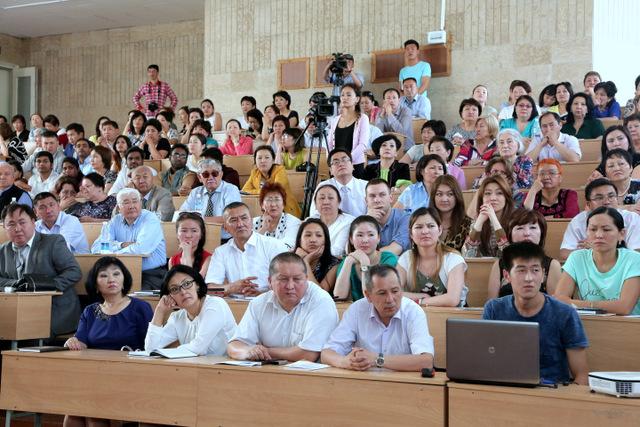The «Mahatma Gandhi and Modern India» Conference, and accompanying presentation of the recently-translated Kyrgyz edition of Gandhi’s My Experiments with Truth, was recently held in Bishkek
June 10, 2016, 06:00
On June 8th, 2016, the “Mahatma Gandhi and Modern India” Conference, and accompanying presentation of the recently-translated Kyrgyz edition of Gandhi’s My Experiments with Truth, was held at the K. Karasaev Bishkek Humanities University.
The Conference was made possible by the support of the International Public Foundation “Roza Otunbayeva Foundation” and the Indian Embassy in the Kyrgyz Republic.
The event was kicked off with a musical performance, which was accompanied by classical Indian folkdances and a short film about the life of Mohandas Karamchand Gandhi.
Next, ex-President of the Kyrgyz Republic Roza Otunbaeva, who was behind the process which led to the book’s translation, said some words of welcome to the assembled guests. During her speech she highlighted Gandhi’s role in the formation of modern India, as well as the strength of his spirit. She said that, when visiting Gandhi’s museum in India, she only saw his glasses, sandals, and scarf; he hadn’t owned anything else. She mentioned that he freed around 400,000 people from violence, and quoted A. Einsten’s comment on Gandhi, “It boggles the mind, how much he has done for the people of India.”
India is the second most populated country on the planet, with 1.08 billion people (a sixth of the Earth’s total population) calling it their home. India is the most ethnically diverse country on Earth, whose economy is attracting more and more interest from the world’s markets. Economic reforms enacted in the last decade have had far-reaching consequences.
A huge and constantly-growing market, developing infrastructure, sophisticated financial sector, flexible investment sector, state benefits, a solid government, and a good economic outlook combine to make India an attractive place for investment. India’s business environment is conducive to reaching a high level and permanent growth.
Additionally, General Secretary of the Ministry of Foreign Affairs of the Kyrgyz Republic Daniyar Sidikov and Director of the Fourth Political Department of the Ministry of the Foreign Affairs of the Kyrgyz Republic Djenbek Kooloobaev made statements at the meeting. During their presentations, they stressed that modern India is not simply an important figure in international affairs, but a regional leader. Political cooperation between Kyrgyzstan and India is based on friendly relationships and the lack of disagreements, both historically and at the current time. Currently, the cooperation between the two countries is based on a solid legal pact, and very successful partnerships have been established in the fields of military-technological cooperation, education, culture, informational technologies, and medicine.
In addition, President of the National Academy of Science of the Kyrgyz Republic A. Erkebaev, social activist E.S. Kaptagaev, Indonologist E.N. Kablukov, Candidate of Historical Sciences at the K. Karasaev Bishkek Humanities University T.M. Riskulov, Professor at the B. Yeltsin KRCY M.N. Sooyumbaev, Indian Ambassador to the Kyrgyz Republic Janayat Khobragade, Plenipotentiary Ambassador S. Kadiraliev, President of the Kyrgyz-Indian Diplomatic Foundation N. Kemelbaev, President of the MUK A. Aidaraliev, Professor at the M. Miraximov National Institute of Cardiology and Therapy A. Saribaev all presented to the assembly.
For Reference:
Mohandas Karamchand Gandhi (1861-1948) was the ideological leader behind the Indian national independence movement. Gandhi’s ideas were responsibly for changing the mindsets of millions of Indians, and marked a changing point in the national consciousness, inter-confessional and inter-caste dialogue, and the peaceful development of the country.